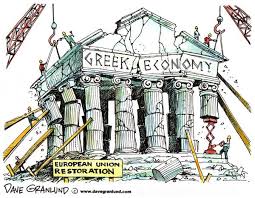A critical task for the Greek economy enters a new phase

OF THE €57.7bn ($ 68.2bn) of loans that Piraeus Bank, one of Greece’s four dominant lenders, had on its books at the end of March, €20.5bn were more than 90 days overdue. A further €11.7bn were also deemed unlikely to be repaid. In all, at the end of 2017 Greek banks carried €95.7bn of such non-performing exposures (NPEs)—at 43.1% of loans, the heaviest burden in Europe. Still, the pile was €13bn smaller than at its peak in March 2016. The banks plan to reduce it by €30bn this year and next.
Dealing with bad loans to business—around 60% of NPEs, mostly to small firms—is the most daunting part of this monumental job. It means resetting the balance-sheet of much of Greece’s economy, from restaurants to manufacturing. But a new phase of this task is under way, with the first sale of secured commercial loans. On May 29th Piraeus said it had agreed to sell Amoeba, a €1.45bn bundle of loans to around 180 borrowers, to Bain Capital Credit, which has previously bought bad debts in Italy and Spain. The collateral, comprising about 1,700 properties, is mainly in big cities. Other banks have been watching keenly. Alpha Bank, another of the four big banks, is weighing a similar sale. Bankers and investors say Amoeba has helpfully spawned an ecosystem of buyers and advisers.
Clearing away the NPE rubble and renewing lending are both vital. GDP shrivelled by a quarter in 2010-13 and then stagnated for three more years. Though it is growing once more, at 1.4% in 2017 and maybe 2% in 2018, it is scarcely roaring back. Write-offs and sales have accounted for most of the reduction in NPEs, though “cures” (as borrowers return to health or simply find the cash) have ticked up too. Sales have mainly been of unsecured consumer debt, for a few cents on the euro. In October Eurobank, another leading lender, sold a €1.5bn portfolio to Intrum, a Swedish specialist, for about €40m. In March Alpha shed €3.7bn of loans to Norwegian-owned B2Kapital Greece for €90m.
Selling business loans is harder. Though provisions already cover half of NPEs, and collateral notionally covers the rest, banks and loan-buyers must still discern which indebted businesses are viable and which not, and what collateral is truly worth. Debtors may owe money to more than one bank, and different parts of a property (parking space, storage areas) may have been pledged separately. Bankers reckon that 25% of defaulters are “strategic”—that is, they can pay but won’t, believing foreclosure will never come.
Lately online public auctions of foreclosed commercial and residential properties have also begun. Up to 20,000 pieces may go under the e-hammer this year. Banks are buying a high proportion themselves—at Piraeus, 80%—but at least sales are happening. Protests prevented physical auctions last year. E-auctions have smoked out some strategic defaulters: perhaps a fifth of properties put up for sale have been pulled when borrowers found the money or asked to restructure the debt.
At the top of the scale Pillarstone, a turnaround specialist owned by KKR, a private-equity giant, is taking on a few large, troubled companies. It is overhauling Famar, a drugmaker, and is close to deals with Alpha and Eurobank to reshape Notos, a department-store chain, and Kallimanis, a frozen-seafood firm. Banks have also set up a forum to tackle companies owing money to more than one lender.
Among other positive signs, all four banks boast healthy capital ratios and came through stress tests by the European Central Bank (ECB) this month without being required to raise more equity. They should soon be weaned off ECB emergency funding, which by April was down to €10.2bn, from €86.7bn in mid-2015. Deposits that gushed out in the crisis have begun to flow back.
Yet much of the masonry is far from firm. Leonidas Fragkiadakis, chief executive of National Bank of Greece, the other big bank, resigned on the eve of the stress tests, having fallen out with his board. Private-sector deposits, at €120bn, are still 45% lower than at the end of 2009. Tens of billions are stashed in homes—even buried in gardens—or abroad.
Despite changes in the law intended to speed up bankruptcies, procedures are still “a mess”, believes Stathis Potamitis of PotamitisVekris, a law firm in Athens. The statute is too complicated for small firms, he says. Many new “out of court” workouts will in fact require judges’ rulings because the state, often the biggest creditor, will object to banks’ plans. And Greece lacks specialised courts: a judge can rule on a divorce one day and a foreclosure the next. Last year, according to Creditreform, a debt-collection group, Greece saw just 120 company insolvencies. Similarly-sized Portugal had over 6,000.
The terms of Greece’s graduation from its third bail-out programme, due in August, also matter. Yannis Stournaras, the central bank’s governor, argues that the government should ask for a precautionary credit line from the European Stability Mechanism, as insurance against a sharp rise in borrowing costs (which would feed through to banks). The left-wing government vehemently disagrees, preferring to rely on building a cash reserve.
Even if banks fulfil their plans, they will still have €65bn of NPEs—a ratio of 35%—at the end of 2019. Theodore Kalantonis, the head of Eurobank’s troubled-assets division, says the “biggest question” is how lenders will come up with a new plan after that, to bring NPEs closer to the European average. “Can we do it? The answer has to be yes. But it will not be easy.”
This article appeared in the Finance and economics section of the print edition under the headline “Rebuilding the ruins”




